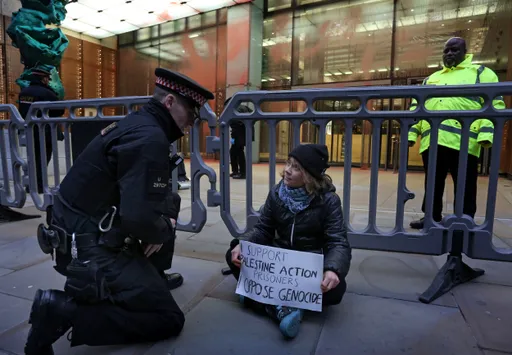Russians angered by the impending inauguration of Vladimir Putin to a new term as president demonstrated throughout the country on Saturday.
Police arrested hundreds, including protest organiser Alexei Navalny, the anti-corruption campaigner who is Putin's most prominent foe.
Police seized Navalny by the arms and legs and carried the thrashing activist from Moscow's Pushkin Square, where thousands were gathered for an unauthorized protest.
The human rights monitor, OVD-Info, wrote on social media that it had received reports that at least 1,029 people had been detained in 19 different cities across the country. It said 475 of the detentions had taken place in Moscow.
Demonstrations under the slogan "He is not our czar" took place throughout the country, from Yakutsk in the far northeast to St. Petersburg and Kaliningrad on the fringes of Europe.
In Russia's second-largest city police blocked off a large section of St Petersburg's main avenue and were seen arresting demonstrators taking part in protests.
Video broadcast on Alexei Navalny's YouTube channel showed the wide Nevsky Prospekt avenue blocked off around Gostiny Dvor, the sprawling trade complex that is one of the city's landmarks.
A crowd estimated at more than 1,000 had earlier begun marching down Nevsky. There was no immediate tally of the number of arrests.
Call for protests
Navalny, who was barred from challenging Putin in the March presidential election, called on Russians to stage a day of rallies across the country ahead of Putin's inauguration.
Protests kicked off in Russia's Far East and Siberia regions, with dosens of demonstrators detained by police, Navalny's team and independent monitors said.
In the eastern Siberian city of Krasnoyarsk 15 people including a journalist were detained, said OVD-Info, an independent monitoring group.
"Detentions were conducted in a rough manner," the monitor said, adding that some of the detained had scratches and bruises.
At least ten protesters were detained in the Siberian city of Barnaul, Navalny's team said.
Eighteen people including several miners were detained in Novokuznetsk in southwestern Siberia, OVD-Info said.
In the Urals city of Chelyabinsk police detained three people before the start of a protest, activist Boris Zolotaryovsky wrote on Facebook.
In Moscow and Saint Petersburg, where the rallies were to begin at 1100 GMT, authorities have not granted permission for the demonstrations to go ahead.
Ahead of the Moscow rally dosens of pro-Putin activists descended on a central square in the Russian capital where Navalny's supporters were also gathering, AFP correspondents reported.
Pro-Putin activists shouted "Our country, our rules" and "We are for Putin."
A number of Navalny's activists were also detained across Russia ahead of the protests on Friday.
Jessica King has more from Moscow.
Not our tsar
"Craven old man Putin thinks he is a tsar," Navalny said on Twitter ahead of the demonstrations. "But he is not our tsar."
Observers have expressed fears that the protests could lead to clashes with police and mass arrests after similar rallies in 2012 led to a huge crackdown on the protest movement.
In May 2012, tens of thousands took to the streets to protest Putin's inauguration for a third Kremlin term.
The rallies descended into clashes with police and hundreds of protesters were detained.
Criminal charges were brought against around 30 demonstrators and many of them were sentenced to prison terms of 2.5-4.5 years.
The 65-year-old Putin, who has ruled Russia for almost two decades, was re-elected for a fourth Kremlin term in March.
He recorded his best ever election performance with more than 76 percent of the vote.
Independent monitors said the election was marred by a lack of genuine competition even though fewer irregularities were reported than in previous years.
Low-key inauguration
This year Putin's minders are planning a fairly low-key inauration ceremony that will not include a lavish Kremlin reception in an apparent effort to eschew any possible bad publicity, TV Rain, an independent channel, reported Friday, citing sources.
In 2012, Putin's black cortège raced through the deserted streets of Moscow on the way to his third Kremlin inauguration with authorities cordoning off roads, in what many saw as a major faux pas.
This time Putin will instead meet with volunteers who took part in his election campaign, the television channel said.
Speaking on radio, prominent political analyst Stanislav Belkovsky said that throwing a Kremlin banquet for the elites "when the number of poor people is sharply rising due to Western sanctions and counter-sanctions" is now seen as an unaffordable luxury.
Putin's journey through the empty Moscow streets to his 2012 inauguration ceremony was seen by many as a "journey of an invader," Belkovsky added.
























